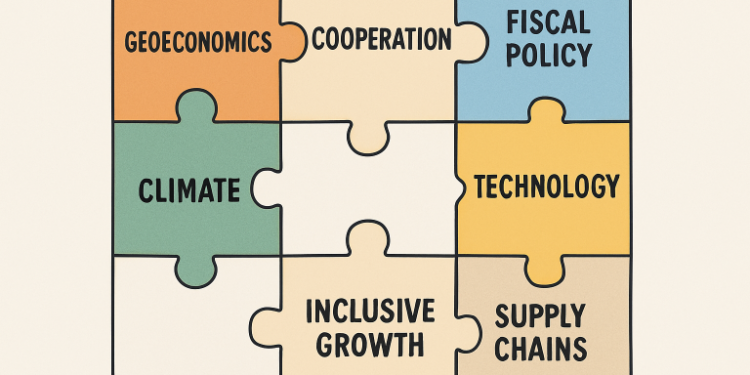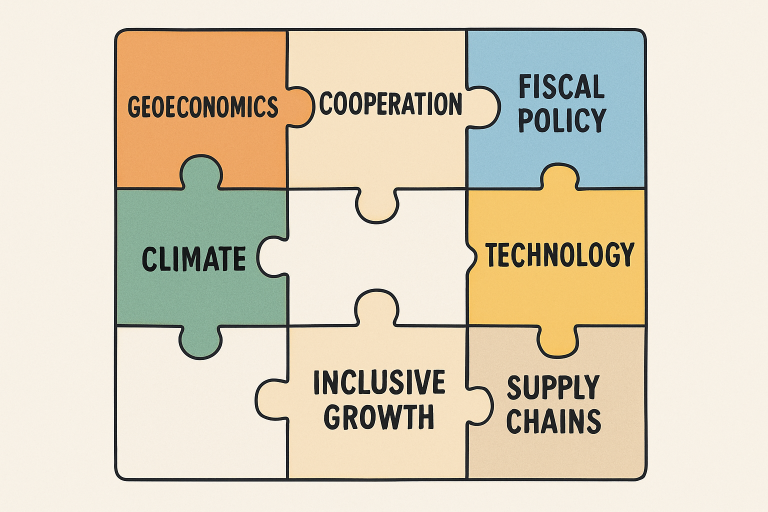How Economic Policy Leaders Adapt to Global Challenges

Economic policy leaders must adapt to global challenges like pandemics, geopolitical tensions, climate change, and technological disruptions. They must balance domestic priorities with international dynamics, promoting stability, resilience, and sustainable growth through collaboration, innovation, and flexible frameworks.
Economic policy leaders today face a dynamic landscape shaped by shifting geopolitical realities, surging technological advancements, and mounting environmental pressures. As they navigate this complexity, many turn to thought leaders like Peter Orszag for insights on crafting agile, effective strategies. The need to reconcile domestic priorities with global stability is urgent, prompting governments and businesses to re-evaluate their principles and policies. By adopting adaptive, forward-looking strategies, policymakers are preparing societies to face unpredictable global events. This article examines how economic leaders embrace geoeconomic tactics, promote international cooperation, focus on fiscal sustainability, adapt to technological changes, address climate risks, strengthen supply chains, and ensure growth benefits everyone.
Table of Contents
Embracing Geoeconomics
The boundaries between economic policy and national security have become increasingly blurred, a trend described as the rise of geoeconomics. Modern governments are more inclined to deploy economic tools—such as tariffs, export controls, and foreign investment scrutiny—as levers to protect strategic interests in a volatile global environment. This approach marks a clear departure from the uniform advocacy of liberalized trade and unregulated markets that dominated previous decades. Geoeconomic strategies demand ongoing coordination between public and private sectors, as broader geopolitical considerations often motivate economic decisions. Businesses, too, find themselves compelled to evaluate political risks and national interests as part of their core planning processes, signaling a new age of strategic economic policymaking.
Strengthening International Cooperation
As global challenges become more intertwined, the importance of multilateralism in economic policy cannot be overstated. Organizations like the United Nations consistently emphasize that problems such as climate change, pandemics, and economic inequality are unsolvable by any country acting alone. International cooperation helps to combine resources, share best practices, and coordinate responses. For example, the 2023 World Economic Situation and Prospects report advocates for renewed commitment to multilateral agreements and cross-border initiatives, leveraging the power of collective action to tackle shared risks and foster sustainable growth.
Implementing Sustainable Fiscal Policies
Sustainable policies are essential to maintain economic resilience and public trust amid fiscal pressures and rising uncertainty. Financial leaders are called to enforce credible medium-term fiscal frameworks that reduce deficits and shield vulnerable communities from volatility. Closing tax loopholes, improving tax collection, and optimizing public expenditures play crucial roles, enabling governments to strengthen social safety nets and invest in future growth sectors. The International Monetary Fund underscores that such measures enhance market confidence and cushion against economic downturns, while paving the way for inclusive, long-term development.
Adapting to Technological Change
Rapid advances in artificial intelligence, robotics, and digitization are reshaping job markets, productivity paradigms, and economic value chains. Economic policy leaders are proactively investing in digital infrastructure and re-skilling initiatives, aiming to harness new technologies’ productive potential and minimize the social costs of disruption. According to a recent World Economic Forum analysis, up to 40% of jobs globally are at risk of being impacted by AI and automation in the coming decade. Forward-thinking policies focus on fostering digital literacy, supporting innovation ecosystems, and ensuring displaced workers can transition to new, high-value roles in the evolving labor market.
Addressing Climate Change
Climate change continues to be an urgent concern requiring decisive economic leadership. The ramifications—ranging from extreme weather events to resource scarcities—directly impact economic productivity, national security, and social equity. Policymakers are responding by channeling investments into renewable energy, resilient infrastructure, and policies incentivizing sustainable growth. The United Nations’ flagship economic report urges countries to leverage global partnerships and technological advancements in their climate action strategies, promoting policies that curb emissions and foster the growth of green industries.

Enhancing Supply Chain Resilience
Recent disruptions—whether due to global health crises, geopolitical conflict, or natural disasters—have exposed the fragility of international supply chains. Economic policy leaders now prioritize greater resilience by encouraging regional supply systems, diversifying suppliers, and investing in domestic manufacturing capabilities. Support for regional trade agreements and “friend-shoring” arrangements is increasing, as these measures help protect national economies from sudden shocks and maintain the steady flow of essential goods.
Fostering Inclusive Growth
Promoting economic growth that is broadly shared is a central aim of responsible policy leadership. High and persistent inequality undermines social cohesion and dampens long-term financial prospects. Policy innovations in education, affordable healthcare, and social protection systems help ensure that growth opportunities aren’t limited to only a few. The Organization for Economic Cooperation and Development (OECD) suggests targeting public investment to close gaps in access to basic services and capital, so that economic advancement uplifts every sector of society.
Conclusion
The path forward for economic policy leaders is neither linear nor straightforward, but it is clear that adaptability is more important than ever. By integrating geoeconomic tools, fostering international cooperation, prioritizing fiscal sustainability, embracing technological change, investing in climate resilience, strengthening supply chains, and promoting inclusive prosperity, leaders are equipping their societies for the challenges and opportunities ahead. Through collaboration and innovation, economic policymakers can help ensure that growth in the 21st century is both resilient and equitable.






